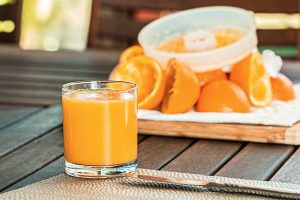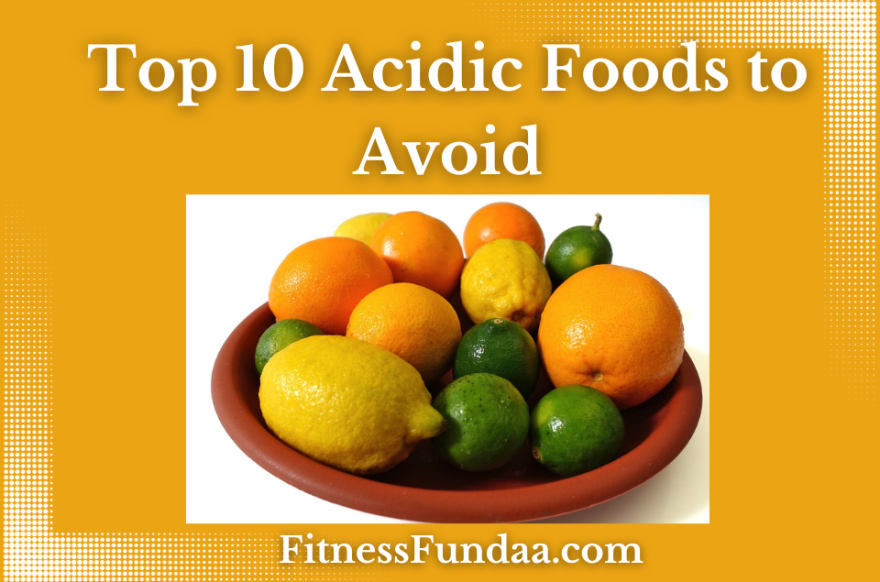Foods with a pH below 7 can disturb the body’s acid-alkaline equilibrium. Those grappling with acid reflux, sensitive stomachs, or dental concerns may need to restrict acidic foods. Inflammatory bowel disease can be aggravated by these foods, and a diet rich in acidity might disrupt pH balance. While not inherently harmful, individual responses vary. Seeking personalized advice from healthcare professionals or dietitians is prudent, especially for those dealing with acid reflux, heartburn, GERD, peptic ulcers, IBD (Crohn’s disease and ulcerative colitis), and gastritis. Top 10 Acidic Foods to Avoid.Acidic Foods to Avoid
These foods may trigger inflammation and discomfort. Individuals with these conditions should be cautious about their diet and seek personalized dietary advice from healthcare professionals. Therefore, in this article, we’ll discuss the top 10 acidic foods to avoid to lead a healthy and balanced.
Here are the Top 10 Acidic Foods to AvoidTop 10 Acidic Foods to Avoid
Citrus Fruits:

Oranges, lemons, limes, and grapefruits, renowned for their acidity, contain citric acid. This component may exacerbate acid reflux and heartburn, potentially due to the high acidity prompting the relaxation of the lower esophageal sphincter. This relaxation permits stomach acid to move back into the esophagus, causing irritation and discomfort. Those susceptible to acid reflux or heartburn could find relief by moderating their consumption of citrus fruits to effectively manage these symptoms.

Tomatoes and tomato-based products, including sauces and ketchup, are acidic due to their content of citric and malic acids. Tomatoes, with their inherent acidity, can act as catalysts for acid-related issues, especially for individuals susceptible to acid reflux or heartburn.
Consumption of tomatoes may induce relaxation of the lower esophageal sphincter, enabling stomach acid to reflux into the esophagus. This reflux can result in irritation and discomfort, prompting those with acid-related conditions to consider moderating their consumption of tomatoes and tomato-based products for effective symptom management.
Citrus Juices:

The natural acidity of orange and grapefruit juices, stemming from their citric acid content, can lead to acid-related challenges such as acid reflux or heartburn. A practical strategy to alleviate these concerns involves diluting the juices with water, effectively decreasing their acidity. This method provides a pragmatic approach for individuals seeking to enjoy citrus juices while mitigating their potential impact on digestive health. This dilution method can be a practical approach for those looking to enjoy citrus juices while minimizing the potential impact on digestive health.
Additionally, choosing low-acid citrus fruits or opting for alternatives like apple or pear juice may be gentler on the digestive system. Drinking juices in small quantities and avoiding them close to bedtime can also help minimize potential discomfort. Individuals with acid-related conditions should consult with healthcare professionals for personalized advice on managing their juice consumption
Vinegar:

Varieties like apple cider vinegar, are characterized by its acetic acid content, imparting acidity. While apple cider vinegar is praised for its health benefits, its acidity can pose challenges for those with acid-related issues. Overindulgence in vinegar, particularly in significant quantities, may worsen conditions such as acid reflux or heartburn. The excessive consumption of vinegar can contribute to discomfort for individuals dealing with these acid-related concerns.
The acidic nature may induce relaxation of the lower esophageal sphincter, permitting stomach acid to reflux into the esophagus and triggering discomfort. Individuals with acid-related concerns should use vinegar sparingly, consider dilution, and consult healthcare professionals for personalized guidance on managing vinegar intake.
Caffeine:

Caffeinated beverages like coffee and tea are naturally acidic due to compounds like chlorogenic acid and tannins. Caffeine, present in these drinks, stimulates stomach acid production, potentially worsening acid-related issues like reflux or heartburn. To manage acidity, individuals may choose low-acid coffee or herbal teas, moderate caffeine intake, and avoid consumption before bedtime. Consultation with healthcare professionals is advised for personalized guidance on acid-related concerns.
Carbonated Beverages:

Carbonated drinks, including colas, derive their acidity from carbonic acid formed by dissolving carbon dioxide in water, imparting a tangy taste. However, the carbonation in these beverages can potentially impact digestive health. The bubbles may contribute to bloating and gas, and the carbonation might relax the lower esophageal sphincter, causing stomach acid to flow back into the esophagus.
This can be uncomfortable for individuals prone to acid reflux or heartburn. To minimize digestive issues, opting for non-carbonated alternatives and staying hydrated with water is advisable. Those with specific digestive concerns should seek personalized advice from healthcare professionals.
Spicy Foods:

Spices and spicy foods, like hot peppers and sauces, contain compounds like capsaicin that contribute to their pungency. While not highly acidic in pH, they impact digestive health by relaxing the lower esophageal sphincter, potentially causing acid reflux. For those prone to acid-related issues, managing spicy food intake, opting for milder options, and avoiding consumption near bedtime can help alleviate symptoms. Seeking guidance from healthcare professionals ensures personalized dietary recommendations
Processed and Fried Foods:

Processed foods and fast food often contain additives and preservatives that contribute to acidity, along with high levels of salt and sugar. These factors can indirectly influence the body’s acid balance. Fried and fatty foods play a role in relaxing the lower esophageal sphincter (LES), increasing the risk of acid reflux.
This relaxation allows stomach acid to flow back into the esophagus, causing symptoms like heartburn and indigestion. Managing acid-related issues involves reducing processed and fast food intake, choosing whole alternatives, and moderating fried and fatty food consumption. Seeking guidance from healthcare professionals helps tailor dietary recommendations to individual health needs..
Alcohol:

Alcoholic beverages (beer, wine, spirits) contain ethanol, contributing to acidity. While their direct pH may not be very low, alcohol can stimulate stomach acid production and relax the lower esophageal sphincter, potentially causing acid reflux.
For those prone to acid-related issues, managing alcohol intake, opting for less acidic choices, and avoiding consumption near bedtime can help. Healthcare professionals can provide personalized advice on alcohol consumption based on individual health conditions.
Individual Variations:

Individual responses to acidic foods vary, and what may cause discomfort for one person might be tolerable for another. Readers must pay attention to their bodies and be mindful of how different foods affect them. Seeking personalized dietary advice from healthcare professionals or registered dietitians is recommended.
They can provide tailored recommendations based on individual health conditions and preferences, ensuring a balanced and suitable diet that meets specific needs. Listening to the body’s signals and seeking expert guidance can contribute to better digestive health and overall well-being.
FAQs for the Article: “Top 10 Acidic Foods to Avoid for Better Digestive Health”
Q1: Why should individuals be cautious about acidic foods?
A1: Foods with a pH below 7 can disrupt the body’s acid-alkaline balance, potentially affecting individuals with acid reflux, sensitive stomachs, or dental concerns. Inflammatory bowel disease can also be aggravated, and a diet rich in acidity might disrupt pH balance.
Q2: Why is seeking personalized advice important for those with acid-related conditions?
A2: Individual responses to acidic foods vary. Seeking personalized advice from healthcare professionals or dietitians is crucial, especially for individuals dealing with acid reflux, heartburn, GERD, peptic ulcers, IBD (Crohn’s disease and ulcerative colitis), and gastritis. Personalized advice ensures a tailored approach to managing these conditions.
Q3: How can citrus fruits impact acid reflux and heartburn?
A3: Citrus fruits like oranges, lemons, limes, and grapefruits contain citric acid, potentially exacerbating acid reflux and heartburn. The high acidity can prompt the relaxation of the lower esophageal sphincter, allowing stomach acid to move back into the esophagus, and causing irritation and discomfort.
Q4: What precautions can individuals take with citrus juices?
A4: Diluting orange and grapefruit juices with water can effectively decrease their acidity, offering a pragmatic approach to enjoying these beverages while minimizing their potential impact on digestive health. Choosing low-acid citrus fruits or alternatives like apple or pear juice can also be gentler on the digestive system.
Q5: How does vinegar, especially apple cider vinegar, impact acid-related issues?
A5: Vinegar, including varieties like apple cider vinegar, contains acetic acid, posing challenges for those with acid-related issues. Overindulgence may worsen conditions like acid reflux or heartburn by inducing relaxation of the lower esophageal sphincter, allowing stomach acid to reflux into the esophagus.
Q6: Why is moderation important for caffeine consumption?
A6: Caffeinated beverages like coffee and tea, due to compounds like chlorogenic acid and tannins, can stimulate stomach acid production. Moderating caffeine intake, choosing low-acid coffee or herbal teas, and avoiding consumption before bedtime can help manage acidity.
Q7: How do carbonated beverages impact digestive health?
A7: Carbonated drinks, including colas, derive acidity from carbonic acid. The bubbles in these beverages may contribute to bloating and gas, while carbonation could relax the lower esophageal sphincter, potentially causing stomach acid to flow back into the esophagus.
Q8: Why should individuals with acid-related concerns be cautious about spicy foods?
A8: Spices and spicy foods, containing compounds like capsaicin, can impact digestive health by relaxing the lower esophageal sphincter, potentially causing acid reflux. Managing spicy food intake, opting for milder options, and avoiding consumption near bedtime can help alleviate symptoms.
Q9: How do processed and fried foods contribute to acid reflux?
A9: Processed foods and fast food, high in additives, preservatives, salt, and sugar, can contribute to acidity. Fried and fatty foods play a role in relaxing the lower esophageal sphincter, increasing the risk of acid reflux.
Q10: Why is individual variation emphasized in the article?
A10: Individual responses to acidic foods vary, and paying attention to how different foods affect the body is crucial. Seeking personalized dietary advice from healthcare professionals ensures tailored recommendations based on individual health conditions and preferences, contributing to better digestive health and overall well-being.
see also :Top 10 Foods High in Electrolytes

